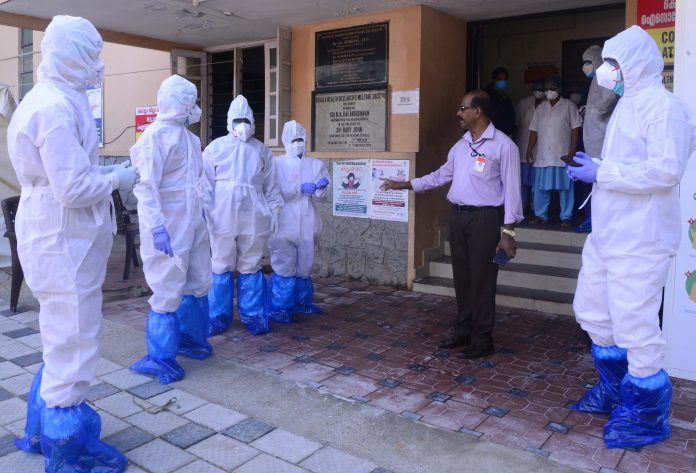
Covid-19, said Prime Minister Narendra Modi, is a war. And the “soldiers” at the forefront of this war are doctors and other health personnel. But they also need to be armed to fight this war lest they lose their lives fighting it. Many already have all over the world. One way to protect them is the special protective suit called the hazmat suit which covers the whole body and prevents the virus from entering. However, in an attempt to make a quick buck, some manufacturers in India are making substandard suits, leading the government to lay down strict guidelines for them.
China and Vietnam are at the forefront of manufacturing personal protective equipment (PPE) like masks and coveralls. Globally, there is a demand for these suits now. Russia has banned their export, while the US is relying on other countries for its supply. In India too, there is an acute shortage of hazmat suits.
On February 29, WHO released a document titled “Rational Use of PPE During Covid-19”, where it downgraded the suit material from viral barrier fabric to fluid-resistant fabric, which is used in normal surgical gowns. It also said that if fluid-resistant gown material isn’t available, these could be made from normal material and worn with a plastic apron. The Centre for Disease Control (US) also said it could be manufactured from normal cloth, but it should be ensured that it is thoroughly washed after every use.
But in times of desperation, people can resort to unusual measures. A Google search by India Legal for hazmat suits in India showed that one can buy them for as little as Rs 198. In Tirupur, the cloth export powerhouse of India, manufacturers are selling these suits at cheap prices. Health experts have cautioned against such suits, stating that they offer “no protection” against the virus. The US and other countries have set standards for such suits since 1994. India didn’t have any standards for coveralls until 2018. Some knowledgeable manufacturers were adhering to guidelines of global bodies like the Association for the Advancement of Medical Instrumentation. However, most are making them without any guidance or standards. This continued until Covid-19 hit India and manufacturers were caught off-guard.
While the government earlier kept mum on standards for PPE, on March 21, guidelines were issued for them. By then, India had more than 600 Covid-19 cases. With flights cancelled and a lockdown imposed, manufacturers were given no time to prepare. The guidelines by the government kept changing. The Ministry of Health and Family Welfare mentioned that coveralls must be impermeable to blood and body fluids. It said that a fabric that had passed the “Synthetic Blood Penetration Resistance Test (ISO 16603)” and a garment that has passed “Resistance to penetration by biologically contaminated solid particles (ISO 22612:2005)” may be considered as a benchmark specification to manufacture coveralls. It also said that coveralls should be taped at the seams to prevent fluid/droplets/aerosol entry.
These guidelines are more stringent than those of WHO and CDC and Indian manufacturers were unable to meet them. Fabric acting as a viral barrier has to be imported and with the disruption of the global supply chain, it wasn’t feasible. India doesn’t manufacture taping machines and therefore, most manufacturers weren’t able to deliver. This gave a free hand to unscrupulous elements who began supplying substandard coveralls in the market. Instances of profiteering during these times also surfaced. For example, rapid test kits imported from China for Rs 245 were sold by distributors for Rs 600.
In an effort to keep the standards high, the textile ministry on April 22 issued guidelines for PPE and coveralls. It said that manufacturers would have to submit a notarised affidavit that their coveralls met all government requirements. The affidavit has to be submitted along with a testing sample of a coverall, which will be sent to a laboratory. On successful approval, it said the government would issue a Unique Certification Code (UCC) valid for six months. The notification said that one needed to be an approved textile manufacturer, not a trader, to get approval. It said that if products don’t meet the required standards, the UCC would be cancelled and criminal prosecution can be initiated against the signatory.
This notification can have many consequences. It will give a boost to genuine manufacturers having the ability to quickly streamline production and stop fly by night operators, leading to accurate time commitments and decreasing manufacturing costs.
Abroad, luxury manufacturers halted production of regular products and shifted to manufacturing essentials like sanitisers, PPE and masks. Standardisation will encourage industrial houses to plan a similar move and support the nation by ramping up production of coveralls and other essentials.
The production capacity in India of coveralls has increased to one lakh per day now. The health ministry has designated HLL Lifecare Limited as the single-window procurement agency for hospitals and healthcare organisations. The ramping up of production, easing of bureaucratic hassles and a single point agency for supply have raised the hopes of India and the world. Though India was late in finalising the standards for these vital items, it could become a global manufacturer of coveralls and export them to other nations too just like it did for hydroxychloroquine and paracetamol in the fight against Covid-19.
Covid-19 has led to a global shift in two areas focus on local communities in becoming self-sufficient and a major distrust of China. Borders have been closed, international flights cancelled and protectionist measures set in place. China has also been blamed by the US, Germany and the UK for hiding the impact and real numbers of Covid-19 deaths. Many companies are also closing their China operations and shifting elsewhere. With increased reliance on local communities, India is taking the right step in this direction to protect its doctors and healthcare workers.
Lead Picture: By UNI

